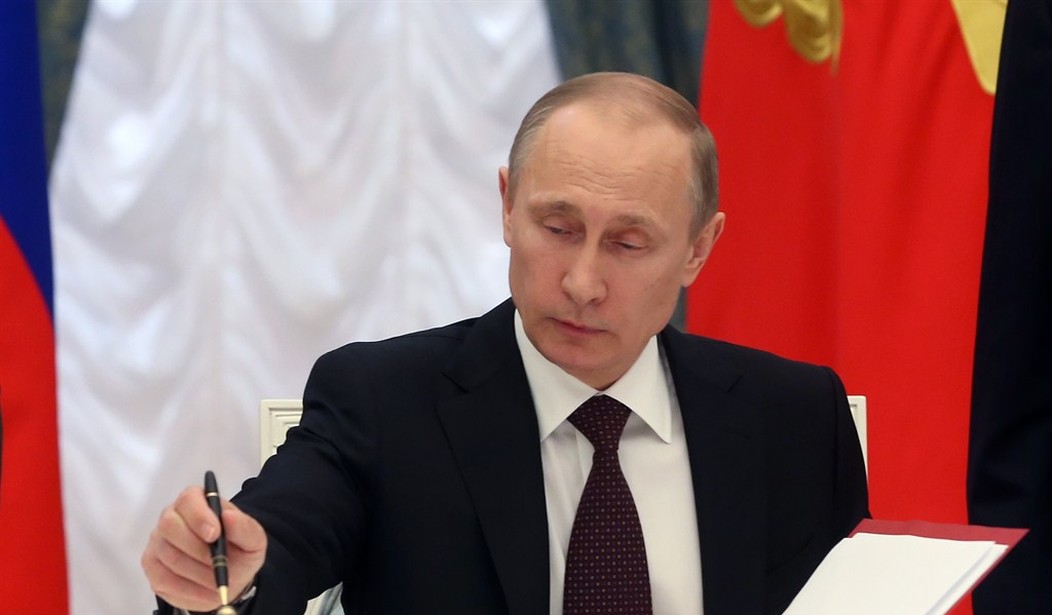"This is my last election," President Obama said in words caught on an open mic. "After my election, I have more flexibility."
He was speaking in Seoul, South Korea, in March 2012, almost exactly two years ago, to Dmitry Medvedev, then in his last year as Vladimir Putin's stand-in president of Russia.
The subject was missile defense, and Obama was apparently seeking time to assuage Russia's objections that a proposed U.S. missile defense system, sited in Romania, Poland, Turkey and Spain, would not be aimed at Russian missiles.
Earlier, in September 2009, Obama canceled missile defense installations in Poland and the Czech Republic, to which Russia objected. The decision was relayed by telephone, at midnight European time, on the 70th anniversary of the Soviet Union's attack on Poland pursuant to the Hitler-Stalin pact in 1939. The Polish prime minister refused to take the call.
"I understand your message," Medvedev told Obama in Seoul. "I will transmit this information to" -- no question of who was in control -- "Vladimir."
It is becoming apparent now what "more flexibility" looks like. And that Mitt Romney was not entirely off the mark when, after Obama's words to Medvedev, he called Putin's Russia "our No. 1 geopolitical foe."
Romney did not predict Putin's seizure of Crimea last month any more than Obama did. Very few people foresaw it during the cascade of events -- the firing on demonstrators in Kiev, the ouster and flight of Ukrainian president Viktor Yanukovich -- that led to it late last month.
Recommended
And Obama probably did not anticipate that Syria's Bashar Assad regime would use chemical weapons after he warned in August 2012, during his reelection campaign, that doing so would be "a red line for us ... that would change our calculus." With the flexibility provided "after my election" and with Putin's help, Obama quietly erased the red line.
The takeover of Crimea rubbed out the red boundary line guaranteed by the U.S., Britain, Russia and Ukraine in the 1994 Budapest Memorandum. In response, Obama imposed weak sanctions on some Russians on March 17 and somewhat stronger sanctions three days later.
Additional F-15s were sent to Lithuania and a dozen F-16 jets were sent to Poland. Vice President Joe Biden journeyed to Poland and assured NATO members of what, absent Obama's flexibility, would not have had to be said: that the United States would maintain its obligations to respond to attack on NATO allies -- Poland, Lithuania, Latvia, Estonia.
These responses are, as former Defense Secretary Robert Gates wrote in the Wall Street Journal on March 25, "anemic." Unsettling possibilities loom. Putin is massing troops near eastern Ukraine and might attack in the name of protecting ethnic Russians there. And there are large Russian minorities in Latvia and Estonia.
In the Netherlands, Obama suggested he'd impose tougher sanctions on Russian businesses if Putin moved further into Ukraine. But he conceded there would be no military response to the seizure of Crimea.
The contagion may spread further. China, long opposed to outside interference in nations' internal affairs, has made it clear it does not oppose Russia's move across a recognized international border. Since Richard Nixon's opening to China, American administrations have tried to capitalize on tensions between China and Russia. Now these two once-Communist powers seem to be coming together.
And China has been asserting sovereignty over disputed islands in the East and South China Seas long claimed by Japan, Taiwan, the Philippines and Vietnam. That follows its earlier declaration of an air defense identification zone jutting out far from its recognized territorial waters.
All this follows from what Gates calls "the fecklessness of the West in Syria" -- flexibility in action. Gates argues that Putin's actions "require from Western leaders strategic thinking, bold leadership and steely resolve -- now."
Gates suggests that Obama reinstate the defense budget he proposed last year, without the sequester-required cuts in this year's budget that would shrink the Army's manpower to 1940 levels and the Navy to 1917 levels.
But that would require difficult negotiations with Republicans on a range of budget issues. Obama has made no serious attempts to negotiate such issues, as President Bill Clinton did with Newt Gingrich, since he raised the ante and broke up the "grand bargain" negotiations in August 2011.
The problem with flexibility and erasing red lines is that it leaves you with little flexibility and tempts others to cross red lines you don't dare erase. "After my election" turns out to be a dangerous time.

























Join the conversation as a VIP Member